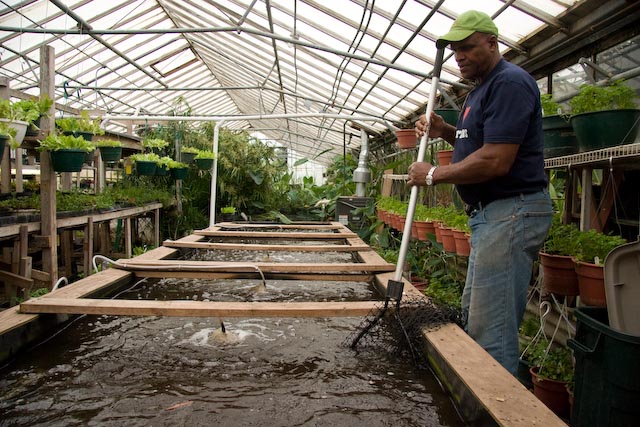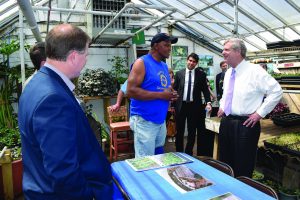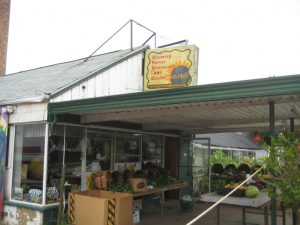Growing Power, Inc. was a Milwaukee farm and non-profit organization that modeled 21st century urban agriculture. It was part farm, part idea factory. It earned international acclaim with founder and CEO Will Allen’s “Good Food Revolution.”[1] Through Allen’s respected community food security leadership, Growing Power shaped the national conversation about urban agriculture and food justice as industrial food system solutions.[2]
A son of Maryland sharecroppers,[3] Allen played professional basketball until 1977. He returned to farming on land owned by his wife’s (Cyndy Bussler) family in Oak Creek.[4] A typical small-scale farmer, Allen maintained full-time off-farm employment while building capacity.[5] In a few years, Allen acquired his first commercial produce customer, Lena’s, the Milwaukee-based independent grocer.[6] In 1993, Allen purchased greenhouses at North 55th St. and West Silver Spring Dr. on Milwaukee’s last parcel of agriculturally-zoned land and founded the eponymous Will’s Roadside Farm Market.[7] Allen’s agricultural goals included youth engagement and increased fresh produce access.[8] Allen formed the non-profit Farm-City Link[9] and worked with his Rainbow Farmers Co-op to bring inexpensive farm-direct “market baskets” to local residents.[10] In 1999, Farm-City Link merged with Hope Finkelstein’s Madison-based Growing Power.[11] Growing Power was committed to involving youth, as exhibited in their Milwaukee and Chicago Youth Corps programs.
Degraded and environmentally toxic soil plague urban areas. To grow produce safely, Growing Power’s urban food strategies included vermiculture and aquaponics, initiated in collaboration with Heifer International.[12] Both methods reclaim excess food and livestock waste to build clean, nutrient-dense media for urban plant growth. Vermiculture mingles worms with food waste salvaged from grocery stores for compost production. Aquaponics combines aquaculture and hydroponics; fish and leafy greens grow on separate levels in a vertically stacked, nearly closed-loop agricultural system. Circulating water moves fish excrement to fertilize the plants; the plants filter water, which is returned clean to the fish tank. Growing Power became a national aquaponics leader, partnering with University of Wisconsin-Milwaukee’s School of Freshwater Science to infuse aquaponics into urban growing environments.[13] Growing Power’s transformative food production techniques paved the way for Allen to receive a MacArthur “genius” grant in 2008,[14] recognition as a Time magazine “hero” in 2010,[15] and his participation in Michelle Obama’s Let’s Move campaign.[16]
Growing Power, with their Growing Food Justice for All Initiative, worked to build community support for both urban agriculture and food justice. Vocal about the low earnings of farmers[17] and his own experiences of discrimination and racism as a black farmer,[18] Allen criticized the marginalization and exploitation inherent in the U.S. food system. Growing Power began hosting a National-International Urban and Small Farm Conference in 2010 to cultivate support for alternatives to industrial food.[19] Instrumental in creating Growing Food Justice for All, Erika Allen, Will Allen’s daughter, advanced dismantling racism as core to a just and sustainable food system.[20] The initiative fostered anti-racism dialogues and leadership training.
Through the practices of Growing Power, Allen worked with alternate food system giants seeking to disrupt the current system of producing and procuring food. In December 2017, after several years of financial trouble, Allen announced his retirement, and the organization formally dissolved itself.[21]
Footnotes [+]
- ^ Will Allen with Charles Wilson, The Good Food Revolution: Growing Healthy Food, People, and Communities (New York, NY: Gotham Books, 2012).
- ^ Will Allen, “A Manifesto,” Growing Power website, last modified May 9, 2009, accessed November 2, 2017.
- ^ Allen, The Good Food Revolution, 52.
- ^ Allen, The Good Food Revolution, 84-93.
- ^ Allen, The Good Food Revolution, 10-12, 92-95.
- ^ Allen, The Good Food Revolution, 96.
- ^ Allen, The Good Food Revolution, 19.
- ^ Allen, The Good Food Revolution, 16.
- ^ Allen, The Good Food Revolution, 112.
- ^ Allen, The Good Food Revolution, 115.
- ^ Allen, The Good Food Revolution, 133.
- ^ Elizabeth Royte, “Street Farmer,” The New York Times Magazine, July 1, 2009.
- ^ Tom Luljak, “Growing Power & Freshwater School Work Together to Fit Aquaculture into Urban Environments,” UWM Today, July 10, 2014, accessed November 2, 2017 (Radio); Mitch Teich, “Aquaponics Workshops in Milwaukee: Teaching People to Grow Their Own Fish,” Lake Effect, February 24, 2017, accessed November 2, 2017.
- ^ “Will Allen: Urban Farmer, Class of 2008,” MacArthur Foundation website, accessed November 2, 2017.
- ^ Van Jones, “Heros: Will Allen,” Time, April 29, 2010.
- ^ Press Release, “First Lady Michelle Obama to Celebrate Impact of Let’s Move!, Announce Updates to the White House Kitchen Garden, and Participate in Her Final Fall Harvest,” The White House website, September 30, 2016, accessed November 2, 2017.
- ^ Allen, “A Manifesto.”
- ^ Allen, The Good Food Revolution, 37-38, 96-98.
- ^ Dan Egan, “Allen Hosts Urban and Small Farm Conference,” Milwaukee Journal Sentinel, September 8, 2012.
- ^ Alfonso Morales, “Growing Food and Justice: Dismantling Racism through Sustainable Food System,” in Cultivating Food Justice: Race, Class and Sustainability, ed. Alison Hope Alkon (Cambridge, MA: MIT Press. 2011), 156-159.
- ^ Sarah Hauer, “Growing Power Founder Will Allen to Retire as Nonprofit’s Debts Mount,” Milwaukee Journal Sentinel, November 20, 2017; Elliot Hughes, “Community Leaders Worry about Growing Power,” Milwaukee Neighborhood News Service, December 3, 2017; Sarah Hauer, “Milwaukee’s Urban Farming Institution Growing Power Has Dissolved,” Milwaukee Journal Sentinel, December 10, 2017; Sarah Hauer, “Growing Power’s Urban Farm Is in Foreclosure,” Milwaukee Journal Sentinel, December 14, 2017.
For Further Reading
Alkon, Alison Hope, ed. Cultivating Food Justice: Race, Class and Sustainability. Cambridge, MA: MIT Press, 2011.
Allen, Will, with Charles Wilson. The Good Food Revolution: Growing Healthy Food, People, and Communities New York, N.Y.: Gotham Books, 2012.
Rakocy, James E. “Aquaponics—Integrating Fish and Plant Culture.” In Aquaculture Production Systems, edited by James H. Tidwell, 344-386. Oxford, UK: Wiley‐Blackwell, 2012.



0 Comments
Please keep your community civil. All comments must follow the Encyclopedia of Milwaukee Community rules and terms of use, and will be moderated prior to posting. Encyclopedia of Milwaukee reserves the right to use the comments we receive, in whole or in part, and to use the commenter's name and location, in any medium. See also the Copyright, Privacy, and Terms & Conditions.
Have a suggestion for a new topic? Please use the Site Contact Form.